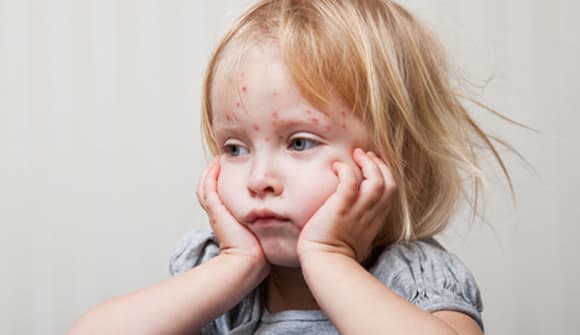Worried about measles?
How to protect your child from this serious condition.
Article Date:

Millions of children across the world have missed their first or second dose of the measles vaccine since the start of the COVID-19 pandemic in 2021, according to Centers for Disease Control and Prevention (CDC) and the World Health Organization.
Measles, also known as rubeola, is a serious and highly contagious viral respiratory illness that can cause serious health complications, especially in children younger than five years old.
“The COVID-19 pandemic caused delays and interruptions in measles immunization campaigns and programs worldwide and weakened measles surveillance,” said Shalika Katugaha, MD, system medical director of Infectious Diseases at Baptist Health.
“Due to missed vaccinations, millions of children are susceptible to measles in the setting of large outbreaks in 2022. In the United States, myths about vaccinations contributed to missed vaccinations.”
While the United States declared measles eliminated in 2000, cases can still spread by unvaccinated travelers from outside the United States and can also spread in under-immunized communities, Dr. Katugaha said.
“Measles remains a common disease internationally, including in Europe, the Middle East, Asia, and Africa. Measles circulates in under-vaccinated communities and can cause outbreaks,” she said.
Measles symptoms
Common measles symptoms include high fever, cough, runny nose, red, watery eyes, and rash. Tiny white spots, known as Koplik spots, may appear inside the mouth two to three days after symptoms begin.
“The rash typically occurs three to five days after symptoms begin and spreads from the head to the rest of the body. Measles symptoms appear seven to 14 days after exposure to the virus,” said Dr. Katugaha.
Some cases of measles can lead to more severe complications such as pneumonia, brain swelling, or even death.
According to the CDC, about one in five people diagnosed with measles will be hospitalized, one in 1,000 people with measles will develop brain swelling, and one to three out of 1,000 people with measles will die.
“Measles can also cause a rare, fatal disease of the central nervous system with intellectual and behavioral deterioration and seizures that develops seven to 10 years after measles infection,” said Dr. Katugaha.
How it spreads
Measles is highly contagious. The disease is so contagious that if one person has it, up to 90% of those around them who are not immune will also become infected, Dr. Katugaha said.
Those who are unvaccinated, including children, adults over 20, pregnant women, and immunocompromised individuals are at the highest risk for serious complications.
If other people breathe the contaminated air or touch an infected surface and then touch their eyes, noses, or mouths, they can become infected.
“It lives in the nose and throat of a person infected with measles and spreads through the air when they breathe, cough or sneeze,” said Dr. Katugaha.
“The virus can stay airborne for up to two hours. An infected person can spread measles before knowing they have the disease, from four days before developing rash through four days afterward.”
Get vaccinated
While the disease can lead to serious health complications, the measles, mumps, and rubella (MMR) vaccine is highly effective at preventing measles.
“The MMR vaccine provides long-lasting protection against all strains of measles. Widespread use of the measles vaccine has led to a greater than 99% reduction in measles compared to the pre-vaccine era,” said Dr. Katugaha.
“Before the measles vaccination program started in 1963, an estimated three to four million people got measles each year in the United States.”
Typically, people get the MMR vaccine in childhood: the first dose at 12 through 15 months of age and the second dose at four through six years of age. If you have had two doses of the MMR vaccine, you do not need a booster.
Two doses of the MMR vaccine are 97% effective, and one dose is 93% effective.
“You should contact your healthcare provider immediately if you think you or your child have been exposed to measles,” Dr. Katugaha said.
“If you’re traveling with young children, reach out to your pediatrician as your child may need an adjusted vaccine schedule.”
Your child’s pediatrician – and your own primary care physician – can help answer additional questions and address concerns you may have about measles and the MMR vaccine. To find the right primary care provider for your family, call 904.202.4YOU (4968).
Sources: Centers for Disease Control and Prevention and World Health Organization



